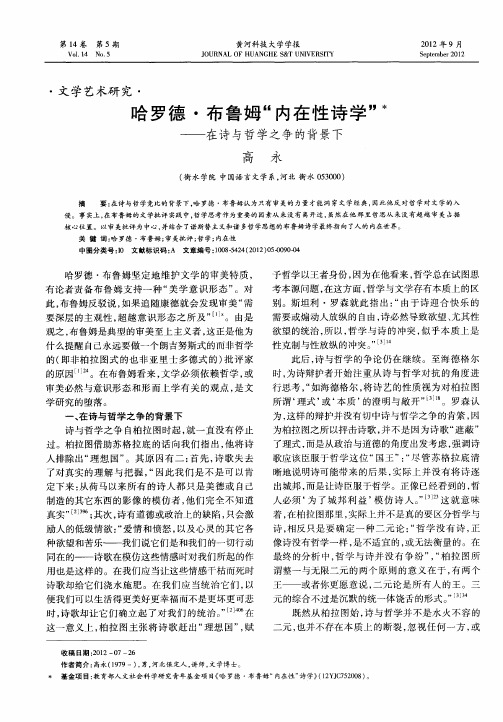哲学与爱默生间的较量
- 格式:doc
- 大小:49.50 KB
- 文档页数:5

爱默生超验主义文学与中国道家的哲学思想拉尔夫·瓦尔多·爱默生是美国超验主义文学的创始人和杰出代表,以开办传播超验主义思想的刊物和俱乐部而闻名。
爱默生的“超灵”是美国超验主义思想的核心,它奠定了美国人的精神基础。
“超灵”是爱默生超验主义的支柱,指灵魂的超验性质,它高于物质,高于感觉,包含了爱默生对世界本原的根本看法。
对爱默生来说,“世界是向往的”,它不过是灵魂的镜子。
灵魂虽然远远高于物质世界,优越于物质世界,但它却是真正的现实,不是人拥有灵魂。
而是灵魂拥有人。
宇宙的灵魂“不是我的,你的,他的,而我们却是它的。
我们是它的财产,它的人。
”每个人不过是他灵魂的外在体现。
“超灵”还含有灵魂的渗透性和超越性。
灵魂深入宇宙的每一部分:“我们看见的世界是单个的:太阳、月亮、动物、树木,但它的全部则是灵魂,具体个别的只是它光耀的部分。
”爱默生的超验主义主张人能超越感觉和理性而直接认识宇宙的真谛或灵魂,它鼓励人去超越各种限制。
无论是内部的还是外部的。
而只有服从这一无处不在、无所不能的灵魂,人才可能达到超越。
爱默生视宇宙为统一体,超灵就是统辖宇宙的唯一心灵,唯一意志,万物从中产生并相互关联;只有一个心灵,每个人都是通向它的走廊。
道家哲学思想里的“道”是形而上的本根,是宇宙的本原。
道家鼻祖老子在《道德经》第一章中写道:“道,可道也,非恒道也。
名,可名也,非恒名也。
无名,万物之始也,有名,万物之母也??两者同出异名,同谓之玄。
玄之又玄,众妙之门。
”“道”不能够用概念解释,却可以通过虚静自我来洞察“道”的幽微玄妙。
因此,虚静自我就为认识“道”提供了宽广的视野。
道家是这样表述宇宙生成的:“道生一,一生二。
二生三,三生万物,万物负阴而抱阳,冲气以为和”。
由此可见,“道”生万物,人天同源是道家思想体系的一个基本观点。
将天、地、人视为一个整体.万物存在着相互影响,普遍联系,可谓“人法地,地法天,天法道,道法自然”。
![爱默生论美国学者[整理]](https://img.taocdn.com/s1/m/4c1f7b10cd1755270722192e453610661ed95aa4.png)
爱默生论美国学者1837年8月31日,爱默生在美国大学生联谊会上以《论美国学者》为题发表演讲,抨击美国社会中灵魂从属于金钱的拜金主义和资本主义的劳动分工使人异化为物的现象,强调人的价值;他提出学者的任务是自由而勇敢地从表相中揭示真实,以鼓舞人、提高人和引导人;他号召发扬民族自尊心,反对一味追随外国学说。
这一演讲轰动一时,对美国民族文化的兴起产生了巨大影响,被誉为是美国“思想上的独立宣言”。
主席先生,先生们:在开始第二个文学年之际,我谨向你们致意。
我们过去的一周年是充满希望的,但也许是努力尚且不够的一年。
我们相聚不是为了如古希腊人那样,进行力量和技巧的较量,朗诵过往历史,悲剧或颂词,也不是为了像中世纪行吟诗人那样为爱情和诗歌而聚集,更不是如当代在英国和欧洲的都市里为科学的进步举行聚会。
目前为止,我们聚会的节日还仅仅是一个良好的象征,它象征着我们由于忙碌而无心于文字的人民中对文学之爱的延续。
就此而言,这个象征弥足珍贵,有如不能被损毁的人类本能。
也许这样的时代已经到来,我们的聚会就要也应该是另番模样。
在这样的时代里,这个大陆的沉睡的心智睁开惺松睡眼,它给这世界带来久已期盼的贡献,这贡献远胜于机械性的技巧的发明。
我们依赖于人的日子,我们心智向其他大陆智慧学习的学徒期,这一切就要结束了。
成百万簇拥着我们涌向生活的同胞,他们不可能永远的满足于食用异国智慧收获的陈粮。
全新的事件和行动正在发生,这一切需要被歌唱,它们也要歌唱自己。
有谁会怀疑,诗歌将会获得新生,并将引领一个新时代?就如天文学家所预言,在我们的天穹之顶的天琴大星将会成为恒亘千年的新北极星?就是抱有这样的期望,我接受这个讲演题目--不仅是在用词上,而是由于时代和我们组织的性质所决定的--美国学者。
时光流转,我们又翻开它传记的新篇章。
让我们来探询,新的时代和事件,在它特质上和对它的期望里又添了什么光色。
有这样一个久远不可考的传说--它有着我们意想不到的智慧。

爱默生 nature读后感英文回答:Nature is a philosophical essay written by Ralph Waldo Emerson. In this essay, Emerson explores the concept of nature and its relationship with humanity. He argues that nature is a source of inspiration and spiritual enlightenment.Emerson begins the essay by stating that nature is a reflection of the divine and that it is a source of truth and beauty. He believes that by immersing ourselves in nature, we can gain a deeper understanding of ourselves and the world around us. Nature, according to Emerson, is a teacher that can guide us towards a more fulfilling and meaningful life.One of the main themes in Nature is the idea of self-reliance. Emerson encourages individuals to trust their own instincts and intuition, rather than relying on societalnorms and expectations. He believes that by connecting with nature, we can tap into our own inner wisdom and live authentically.Emerson also emphasizes the importance of solitude and contemplation. He argues that spending time alone in nature allows us to reconnect with our true selves and find inner peace. In the hustle and bustle of modern life, it is easy to lose touch with our own thoughts and emotions. Nature provides a sanctuary where we can escape from the noise and distractions of the world and find solace in silence.Furthermore, Emerson highlights the interconnectedness of all living beings. He believes that every part of nature is connected and that humans are part of a larger web of life. This interconnectedness should inspire us to treat nature with respect and care. Emerson urges us to see ourselves as stewards of the Earth, responsible for preserving its beauty and harmony.In conclusion, Nature by Ralph Waldo Emerson is a thought-provoking essay that explores the significance ofnature in our lives. Through his eloquent writing, Emerson urges us to reconnect with nature, trust our own instincts, and live authentically. By immersing ourselves in nature,we can find inspiration, wisdom, and a deeper understanding of ourselves and the world around us.中文回答:《自然》是拉尔夫·沃尔多·爱默生所写的一篇哲学性的文章。


爱默生与梭罗的文学自然观异同爱默生和梭罗同为美国先验主义文学的代表人物,二者均强调文学创作应摆脱理性主义的逻辑和形式化羁绊,摒弃宗教文学的等级和秩序理论。
文学没有范本,没有约定俗成的结构,文学应该是想象力不受约束的表达和个体道德和美感的提升。
不论是爱默生还是梭罗,他们均认为文学是表达自然、人和心灵之间关系的纽带,是用来体现三者关系最重要的范本。
在二者先验主义文学框架下,自然处于核心地位。
梭罗继承了爱默生的主要文学观点,二者对自然的理解有同有异。
1 相似点首先他们的观点体现在“万物皆有灵”上。
在《自然》中,爱默生阐述了人、自然和精神三者关系,指出宇宙包括自然和精神。
精神无处不在,而自然是精神或“超灵”的具体象征,因此作家应回归自然获取启示和灵感。
自然也是上帝的表象,我们可以通过直觉直接与上帝沟通。
人只有通过亲近自然的方式我们的精神才有价值和意义,而亲近自然的唯一方式就是身体与自然的结合。
我们的生命与自然之灵相通而我们的精神应该追求真理和情操。
梭罗观点深受爱默生的影响,认为精神是宇宙间最高级的存在方式,是神秘的、无处不在的和无所不包的。
精神存在于自然界本身,“万物皆有灵”。
梭罗赞同爱默生关于自然本质的文学观点,认为自然是宇宙精神物化的表达方式。
他强调,自然是宇宙精神的衍生物,自然精神与人之精神是相通的。
自然本质不是感官经验,而是无处不在的精神的外在形态,因此文学作品应该体现这样的统一和谐。
其次,二者都认为自然可以净化心灵。
自然对人的灵感有巨大的启示作用,可以治愈疾病,减轻痛苦。
爱默生认为只有当一个人从自然中得到上帝的启示时,才能消除心中魔障从而阅读上帝的心灵。
尽管自然是上帝的化身和绝对真理的体现,其最重要的功能是洗涤心灵,指引人们回归精神家园。
梭罗也有类似观点,他认为自然可以提高人们的道德水准,净化人们的心灵。
为了实践这个思想,梭罗来到瓦尔登湖畔,长期居住,进行观察和体验,创作了《瓦尔登湖》这部散文集。

《平凡中的伟大作文素材_平凡的伟大》摘要:爱默生说:“大自然中总蕴涵着精神的色彩,爱默生降临人世,伟大的品格或卓越的天赋并不少见,但兼具两者的人却不多见,爱默生就属于精英中的伟人美国思想家、诗人拉尔夫・沃尔多・爱默生以睿智的文字改变了无数人的人生,100 多年后,一位来自澳洲的爱默生用惊人的才华改变了网球的历史,用完美的品行影响了无数青年才俊。
当费德勒在法拉盛捧起奖杯,全世界为之赞叹,12 座单打大满贯,记录的创造者尤为激动。
爱默生为后辈追平40 年前的记录鼓掌,他相信罗杰能很快超越自己,超越桑普拉斯。
但16个双打大满贯和总共28个大满贯的记录恐将空前绝后。
爱默生与同胞们创建的澳洲帝国无比风光,他帮助澳洲八次称雄戴维斯杯,又一项难以企及的记录。
孩提时爱默生曾想当一名外科医生:“我非常尊敬医生,他们所做的简直是难以置信。
” 但显然他的出众身体素质更适合运动场。
父母看出他的网球天赋,举家搬到布里斯班,在昆士兰州的首府,爱默生接受更加专业和全面的训练,参加更高水平的比赛,很快,小镇男孩成为大城市里的明星。
人们亲切地称呼他“埃莫”(Emmo)。
1959 年温网,爱默生同尼尔・弗雷泽合作拿下男双冠军,他的首个单打大满贯来自家乡,1961 年决赛力克拉沃尔捧杯。
1963-1967 年,爱默生书写的澳网5 连霸至今无人能够接近。
而他也将名字刻上其他三大满贯的奖杯,是拥有全部四大满贯的五位男选手之一。
爱默生的双打造诣也令人惊叹,16 座双打大满贯来自与5 位搭档的合作,他还是唯一将单双打四大满贯全部收入囊中的男选手。
在戴维斯杯上,爱默生在单双打所向披靡,9 年间征战40 场只尝过4次败绩。
尽管保持着多项记录,爱默生却很少被认为是历史上最伟大的男球手之一,他的名望也不及罗德・拉沃尔和肯・罗斯沃尔。
和他同时代的美国名将克莱莫在自传中列出心目中的历史20 位最伟大男球员,爱默生不在其列,克莱莫只是写道:“他是历史上最好的双打选手。
有关选择的名言警句或优美语段1. 关于选择的名人名言1、决定你是什么的,不是你拥有的能力,而是你的选择.——杨澜2、选择就像是人位于一个岔路口。
走哪条路都要靠他自己的决策。
命运不是机遇,而是选择。
——J.E.丁格3、对于每一个人,他所能选择的奋斗方向是宽广的。
——爱因斯坦4、人生中最困难者,莫过于选择。
——莫尔5、君子择交莫恶于易与,莫善于胜己。
——明末清初思想家王夫之6、比起拥有更多的,还不如经常选择更少的希望。
——德国作家凯姆庇斯7、如果你能成功地选择劳动,并把自己的全部精神灌注到它里面去,那么幸福本身就会找到你。
——19世纪俄国教育家乌申斯基2. 关于选择的名言选择大凡学哲学的人,都会沉浸于一些人生最根本最基本的问题,被思辩的重重矛盾所折磨,发出一些震撼人心的质问与呐喊,比如:今天晚上谁做饭?谁去洗衣服,又是谁去洗碗?明天去超市买什幺,头顶的星空还是内心的道德法则?这些问题,把我们引向更高更远的境界,使人深邃、使人厚重,慢慢地变得像真的一样。
谈到买头顶的星空还是买内心的道德法则,本质上就是一个选择问题。
有的喜欢买一斤星空炒个空心菜,有的喜欢称二两道德法则发点海蜇皮,都是一般的市民,资源总是稀缺的,永远符合经济学的基本假设,并向经济学家们提供持久与充沛的职业安全感。
资源有限,就需要选择;资源太多了,其实更加需要选择。
世间的事都大抵如此。
不是这个,就是那个;不是to be,就是 not to be 。
人生的过程,从某种意义上来说,就是一连串选择的过程,环环紧扣,滚滚向前,有去无回。
To be,or not to be?哈姆雷特,这个忧郁敏感的瑞典王子,牙疼般地喃喃自语。
一千种场景就有一千个哈姆雷特,买还是不买?卖还是不卖?嫁还是不嫁?娶还是不娶?要还是不要?说还是不说?杀还是不杀?偷还是不偷?逃还是不逃?留还是不留?——每一个人,注定在有生之日的每一天,都反反复复永无止境地经历着这样的质问,无奈地喃喃自语。
从爱默生的《论自然》看超验主义的智慧哲学来源于生活,并最终服务于生活,好的哲学思想能够指导人们远离蒙昧,活出精彩的人生,带给人们智慧,它的价值远远大于物质财富。
可是,大多数哲学理论都是晦涩难懂的,让人望而生畏,结果导致很多人面对宝藏却往往空手而归。
美国文学家、哲学家爱默生的出现,很好地帮助人们解决了这个问题,他寓哲学于文学,用生动的、形象地语言表达出深邃的哲学思想, 使人们在欣赏文学美的同时,了解了人生的真谛,获得了人生的幸福。
爱默生所倡导的哲学思想是超验主义,超验主义最核心的思想就是:人能够摆脱感觉和理性的束缚,与真理建立直接的联系。
超验主义用全新的视角看待自然界,强调精神的力量以及个人的重要性,它极大地发挥了人们的主观能动性,给人们的生活带来了积极健康的活力。
爱默生的代表作《论自然》便是这一思想的集中体现。
、自我启示爱默生认为每个人都应该培养自己对世界、对宇宙的独特的理解。
他强调人不应该依赖二手信息,即过去的智慧,以及被继承下来,已经成为惯例的知识,人要成为自己思想的主人。
他在《论自然》中说:“我们的时代是怀旧的……前人面对面地观察上帝,而我们却透过前人的眼睛来看。
为什么我们自己不去建立与宇宙的直接的联系?为什么我们不用诗歌和哲学去赞美智慧, 反而去赞美传统?我们应该信仰自我启示,而不是前人的历史。
”人生最大的自由,不是能想去哪就去哪的行动自由,也不是想买什么就买什么,建立在丰富物质基础上的消费自由,真正的自由,是心灵的自由,是不依赖于任何人的思想的自由。
生活在现代社会中的人们,早已失去了这种自由,被淹没在现代资讯的海洋里。
在现代社会,各种思想,各种观念你方唱罢我登场,新旧更替十分迅速,随波逐流的人们怎能把握真正的智慧?于是只能被时代的大潮牵着鼻子走, 无法翻身做自己的主人。
爱默生的超验主义思想宛如黑夜里的一盏明灯,为疲惫的人们指引前进的正确方向,如果人们能停下匆忙的脚步,用心与这个世界建立直接的联系,那么,自由与幸福便是属于人们的,谁也拿不走的宝藏。
原文:Philosophy vs. Emerson (Excerpt)“HE is,” said Matthew Arnold of Emerson, “the friend and aider of those who would live in the spirit.” These well-known words are perhaps the best expression of thesomewhat vague yet powerful and inspiring effect of Emerson,s courageous butdisjointed philosophy.Descended from a long line of New England ministers, Emerson, finding himselffettered by even the most liberal ministry of his day, gently yet audaciously steppeddown from the pulpit and, with little or no modification in his interests or utterances,became the greatest lay preacher of his time. From the days of his undergraduate essay upon “The Present State of Ethical Philosophy” he continued to be preoccupiedwith matters of conduct: whatever the object of his attention—an ancient poet, a factin science, or an event in the morning newspaper—he contrives to extract from it alesson which in his ringing, glistening style he drives home as an exhortation to ahigher and more independent life.Historically, Emerson marks one of the largest reactions against the Calvinism of hisancestors. That stern creed had taught the depravity of man, the impossibility of anatural, unaided growth toward perfection, and the necessity of constant and anxiouseffort to win the unmerited reward of being numbered among the elect. Emerson startswith the assumption that the individual, if he can only come into possession of hisnatural excellence, is the most godlike of creatures. Instead of believing with theCalvinist that as a man grows better he becomes more unlike his natural self (andtherefore can become better only by an act of divine mercy), Emerson believes that asa man grows in excellence he becomes more like his natural self. It is common to hearthe expression, when one is deeply stirred, as by sublime music or a moving discourse: “That fairly lifted me out of myself.” Emerson would have said that such influenceslift us into ourselves.For one of Emerson’s most fundamental and frequently recurring ideas is that of a “great nature in which we rest as the earth lies in the soft arms of the atmosphere,” an “Over-Soul, within which every man’s particular being is contained and made onewith all other,(The phrase originates with Ralph Waldo Emerson in his 1841 essay by that name)”which “evermore tends to pass into our thought and hand and become wisdom and virtue and power and beauty.”This is the incentive—the sublime incentive ofapproaching the perfection which is ours by nature and by divine intention—thatEmerson holds out when he asks us to submit us to ourselves and to all instructiveinfluences.Nature, which he says“is loved by what is best in us,”is all about us, inviting ourperception of its remotest and most cosmic principles by surrounding us with its simpler manifestations.“A man does not tie his shoe without recognizing laws whichbind the farthest regions of nature.”Thus man “carries the world in his head.” Whether he be a great scientist, proving by his discovery of a sweeping physical law that he has some such constructive sense as that which guides the universe, or whether he be a poet beholding trees as“imperfect men,”who“seem to bemoan their imprisonment, rooted in the ground,”he is being brought into his own by perceiving “the virtue and pungency of the influence on the mind of material objects, whether inorganic or organized.”Ranging over time and space with astonishing rapidity and binding names and things together that no ordinary vision could connect, Emerson calls the Past also to witness the need of self-reliance and a steadfast obedience to intuition.The need of such independence, he thought, was particularly great for the student, who so easily becomes overawed by the great n ames of the Past and reads “to believe and take for granted.”This should not be, nor can it be if we remember what we are. When we sincerely find, therefore, that we cannot agree with the Past, then, says Emerson, we must break with it, no matter how great the prestige of its messengers. But often the Past does not disappoint us; often it assists us in our quest to become our highest selves. For in the Past there have been many men of genius; and, inasmuch as the man of genius has come nearer to being continually conscious of his relation to the Over-Soul, it follows that the genius is actually more ourselves than we are. So we often have to fall back upon more gifted souls to interpret for us what we mean but cannot say. Any supreme triumph of expression, therefore, should arouse in us not humility, still less discouragement, but renewed consciousness that “one nature wrote and the same reads.”So it is in travel or in any other form of contact with the Past: we cannot derive any profit or see any new thing e xcept we remember that “the world is nothing, the man is all.”Similar are the uses of Society. More clearly than in Nature or in the Past, we see in certain other people such likeness to ourselves, and receive from the perception of that likeness such in spiration, that a real friend “may well be reckoned the masterpiece of nature.”Yet elsewhere Emerson has more than once urged us not to be “too much acquainted”: all our participation in the life of our fellows, though rich with courtesy and sympathy, must be free from bending and copying. We must use the fellowship of Society to freshen, and never to obscure,“the recollection of the grandeur of our destiny.”Such, in some attempt at an organization, are a few of Emerson, s favorite ideas, which occur over and over again, no matter what may be the subject of the essay. Though Emerson was to some degree identified, in his own time, with various movements which have had little or no permanent effect, yet as we read him now we find extraordinarily little that suggests the limitations of his time and locality. Often there are whole paragraphs which if we had read them in Greek would have seemed Greek. The good sense which kept him clear of Brook Farm布鲁克农场because he thought Fourier (Charles Fourier,1772年- 1837,是法国著名哲学家,经济学家,空想社会主义者。